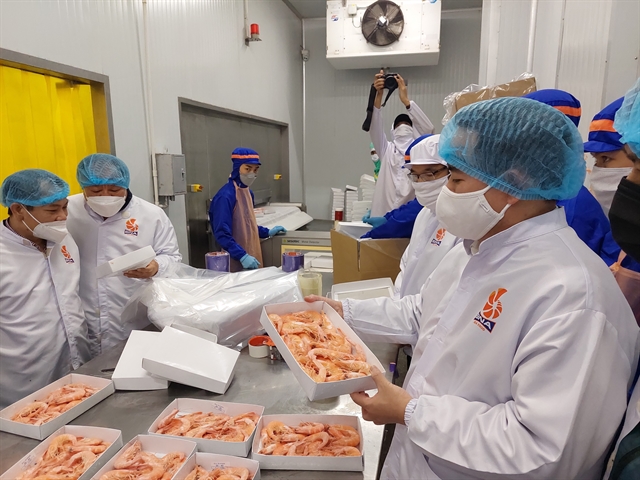 Economy
Economy


|
| Shrimp processed at a factory in Quảng Ninh Province. The high inflation in many key import markets had left Vietnamese producers with no choice but to seek customers elsewhere. VNA/VNS Photo Thanh Vân |
HÀ NỘI — The Vietnamese shrimp industry has made it through a tough year of weakening demand and come out afloat, according to business leaders.
Hồ Quốc Lực, chairman of the Sao Ta Foods JSC, revealed that his company had had a hard time dealing with falling revenues and mounting costs.
The falling revenues came from the fact that high inflation in the US and EU has sapped consumption, leading to fewer orders from abroad.
The depreciation of the euro against the Vietnamese đồng, and the mounting transport costs in major importing countries fuelled the situation, adding to its bills.
Amid the unfavourable conditions, the company has doubled down on processed seafood to target high-end markets to make up for its reduced earnings, and succeeded.
He said Japan was its alternative market that has an appetite for extensively-processed shrimp, in terms of which Vietnamese companies have a huge competitive advantage over Ecuadorian and Indian rivals.
Thanks to its change in customer base, the company has managed to maintain sales and turn the low transport costs in the market to its advantage. In fact, Japan has become its largest importer in the past two years.
Trương Đình Hòe, general secretary of the Vietnam Association of Seafood Exporters and Producers (VASEP), estimated total Vietnamese shrimp exports in 2022 at US$4.3 billion, up 10 per cent year-by-year.
He said free trade agreements (FTA), including CPTPP and EVFTA, were one factor that has helped Vietnamese shrimp producers to pull off such a high figure in difficult times.
The agreement put Vietnamese shrimp at a tariff advantage over those from non-FTA countries and allowed the seafood to enter foreign markets more easily. Specifically, Vietnamese shrimp exports to Canada, Mexico, and Australia rose by 30 per cent on the back of the trade deals.
Perseverance was another factor. Hòe said Vietnamese shrimp producers kept shrimp farms up even at the peak time of the pandemic. This risky move has kept output stable and enabled faster post-pandemic production recovery.
"One lesson learned from the pandemic: perseverance is the key to recovery. Thanks to their perseverance, shrimp producers took less time to recover than those operating in other industries," said Hòe.
Lê Hằng, communication director of VASEP, shared Hòe's view, saying the FTA was a major factor that was helping Vietnamese seafood exports sustain the momentum in 2022.
Remarkably, Vietnamese seafood exports to CPTPP countries went up 31 per cent during the year, raking in US$2.9 billion. She said FTA-induced tariff advantages had been fully exploited to boost sales, filling the gap left by the weakening demand in other countries.
The director believed that FTA countries, especially ASEAN and China, would remain the best alternatives for inflation-ravaged importers in 2023.
"China is expected to ease the 'Zero Covid' policy in the short term, unlocking a market of 1.5 billion potential customers to Vietnamese seafood producers," said Hằng.
With such a great opportunity in sight, she urged the producers to stockpile raw materials and mobilise capital to get the upper hand once the country is fully opened. —VNS




